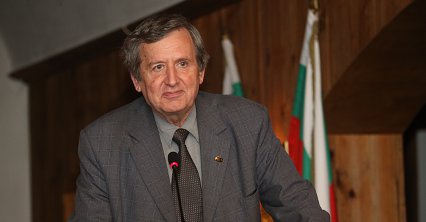
Academician Georgi Markov has tracked down the hardships that the Tarnovo Constitution had to withstand during its 68th years history. The distinguished Bulgarian scientist presented the key report of the second day of the scientific conference themed: “135 years Bulgarian parliamentarism”. The forum was held in the premises of the former Constituent Assembly in the town of Veliko Tarnovo.
“From the theory to the practice and from the paper to real life the distance is as long as are the good wishes to the harsh reality. Even the most deeply thought-out and perfect text wording doesn’t always find its correct and appropriate application”, Markov said. According to him the question is whether the theory does not fit real life, or the latter disproves it. In his view sometimes the achievements of lawmakers diverge from the expected results. History, Markov further said, is a patient eyewitness of events unpredicted by even the perfect laws, not predicted even by the basic law of a state.
When we take pride in the liberal Constitution of 1879 we should take into account the time of its creation and the trials and hardships she had gone through, declared Academician Georgi Markov.
Another speaker at the conference, Professor Radoslav Mishev, outlined the place of the Tarnovo Constitution within the existing constitutional systems in Europe at the end of 19th century. At the time of the Tarnovo Constitution’s creation there were in Europe five forms of state government: parliamentary monarchy – Great Britain and Belgium; constitutional monarchy – the German Reich, the Kingdom of Italy, Austria – Hungaria and others; republican - France; absolute monarchy – the Russian Empire; theocratic monarchies – the Vatican and the Osman Empire. The prevalent tendency though was the constitutional monarchies. According to Prof. Mishev the Tarnovo Constitution corresponds to the model of those monarchies and was the best for Bulgaria at the time. Unfortunately the Tarnovo Constitution had stopped at the achievements of the end of the 19th and the beginning of the 20th century and the Bulgarian society, due to many mistakes, could not adapt it to the new realities after the First World War. On the contrary the constitution was suspended and finally abolished after WWII, Prof. Mishev concluded.
The 3 day-long Conference: “135 years of Bulgarian parliamentarism” is held on the occasion of the 135th year since the adoption of the Tarnovo Constitution. The forum is taking place in the town of Veliko Tarnovo and is organized by the National Assembly, together with the Faculty of History of “St.st. Cyril and Methodius” University of Veliko Tarnovo and the Faculty of Law of Sofia University “St. Kliment Ohridski”.

- 22/04/2021
The Parliament imposed a moratorium on concessions, real estate deals and appointments pending the election of a new cabinet or caretaker government - 16/04/2021
By 156 votes “in favour”, the National Assembly accepted the resignation of the Council of Ministers with Prime Minister Boyko Borisov - 15/04/2021
Speech by Mrs. Iva Miteva upon her election as a President of the 45th National Assembly - 15/04/2021
The Member of Parliament Iva Miteva was elected President of the 45th National Assembly - 15/04/2021
The Members of the 45th National Assembly were officially sworn in - 03/03/2021
The President of the National Assembly Tsveta Karayancheva and MPs attended the solemn fireworks-retreat on the occasion of the Liberation of Bulgaria - 03/03/2021
Every Bulgarian should preserve and honour the memory of those glorious ancestors, thanks to whom Bulgaria exists today, said the President of the National Assembly Tsveta Karayancheva in Gabrovo - 03/03/2021
Today we are on Shipka to pay our respects to all the heroes who sacrificed their lives for freedom, said the President of the National Assembly Tsveta Karayancheva after climbing Shipka Peak together with young people from all over the country - 02/03/2021
The Vice-President of the National Assembly Valeri Simeonov received an award from the Bulgarian Republican Self-Government in Hungary - 26/02/2021
The Parliament adopted at second reading amendments to the Measures Against Money Laundering Act
 Български
Български English
English